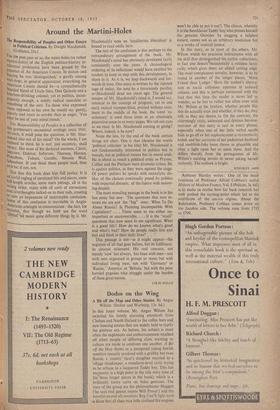Dodos on the Wing
A Bit off the Map and Other Stories. By Angus Wilson. (Seeker and Warburg, 13s. 6d.)
IN this latest volume Mr. Angus Wilson has switched his faintly alarming attention's from Chelsea and North Oxford to the coffee bars and new housing estates that are widely held to typify the postwar era. As before, his subject is most often the explosions and embarrassments touched off when people of differing class, training or culture are made to confront one another. A Bit off the Map shows us a pampered young Jewish sensitive uneasily involved with a grubby but twee floosie, a 'county' vicar's daughter married to a village shopkeeper, a mandarin-level critic trying to be urbane to a lacquered Teddy boy. This last encounter is a high point in the title story (one of thethree longer pieces in the book), which is a brilliantly funny satire on Soho geniuses. The stars of the group are the philosophaster Huggett ('he says real, genius means Will Power') and the novelist-to-end-all-novelists Reg ('we'll light such - a blaze that all their nice little civilised fire-engines
won't be able to put it out'). The climax, whereby it is:the bewildered Teddy boy who proves himself the genuine Outsider by slugging a helpless dotard, comes not as an arbitrary resolution but as a stroke of ironical justice:
In this story, as in most of the others, Mr. Wilson wields his precision instruments with all the skill that distinguished his earlier collections; in fact one detectsroccasion'ally a ruthless farci- cality, which gives them an added cutting edge. The most conspicuous novelty, however, is to be found in another of the longer pieces, 'More Friend than Lodger.' Here the author's absorp- tion in social collisions operates at reduced volume, and this is perhaps connected with the fact that this time the reader is never led to wonder, as he has to rather too often even with Mr. Wilson at his liveliest, whether people like this do actually exist and whether, if they do, they talk as they are shown to. On the contrarY, the charmingly catty, animated and. devious heroine- narrator of this story is real in every phrase, especially when one of her little verbal squibs . fails to go off or her sophistication is momentarily holed, and her accounts of her pedestrian husband and snobbish-fake lover throw as plausible and clear a light upon her as upon them. And she differs sharply from the protagonists of Mr. Wilson's existing novels in never taking herself seriously. The outlook is bright.
K,INGSLEY AMIS
Anthony Hartley writes : One of .the main functions of Professor. Alfred Cobban's useful History of Modern France, Vol. I (Pelican, 3s. 6d.) is to make us realise how far back .research has now pushed the turning-point which led to the overthrow of the ancien regime. About the Revolution, Professor Cobban comes down on the Jacobin side. The volume runs from 1715 to 1799.


































 Previous page
Previous page